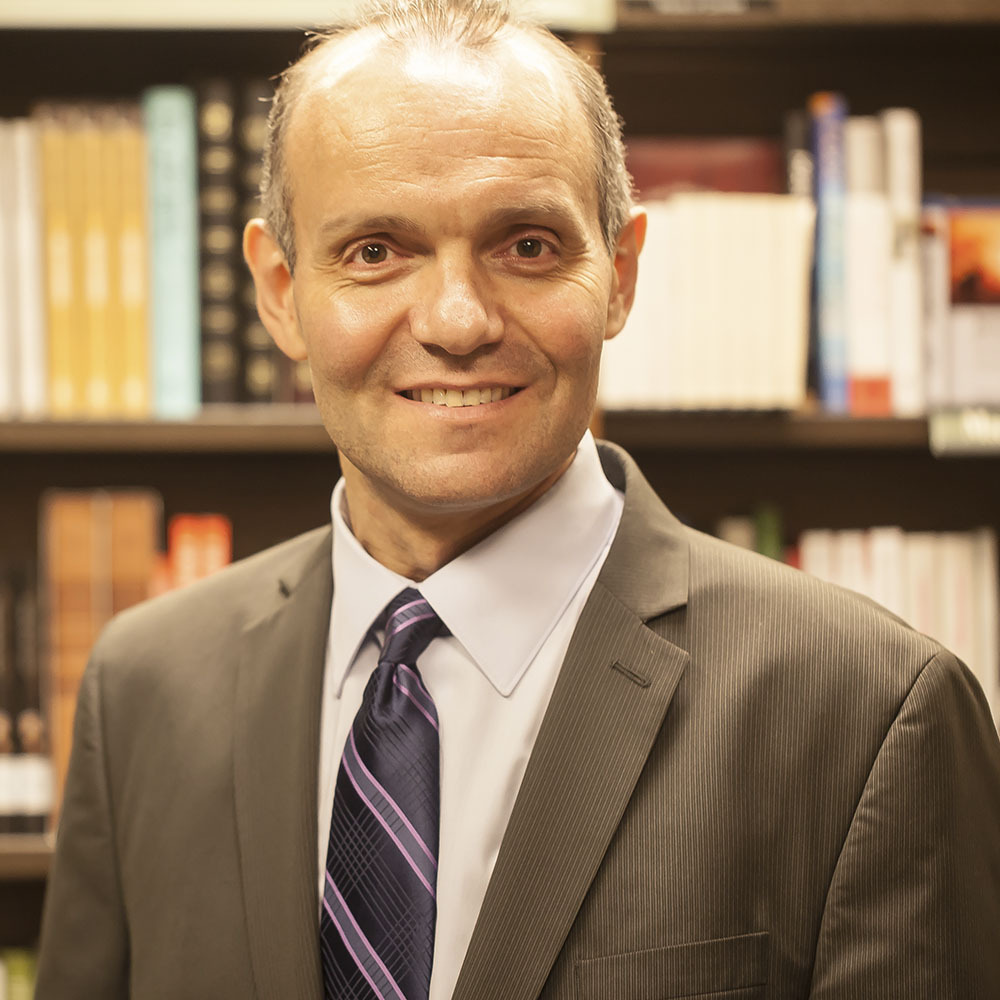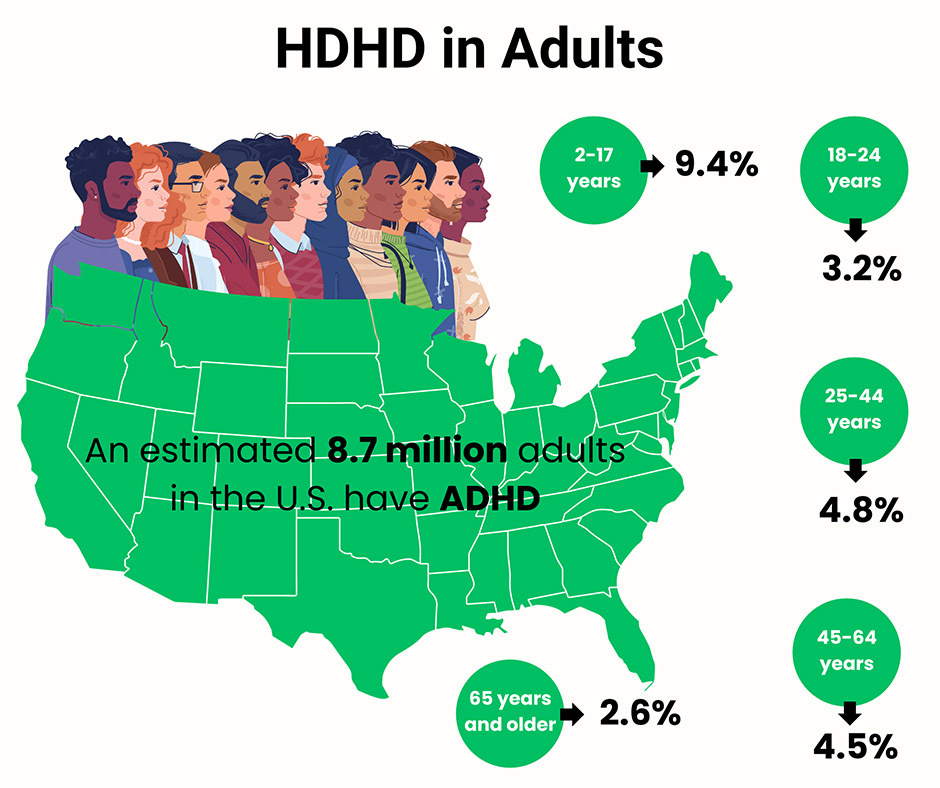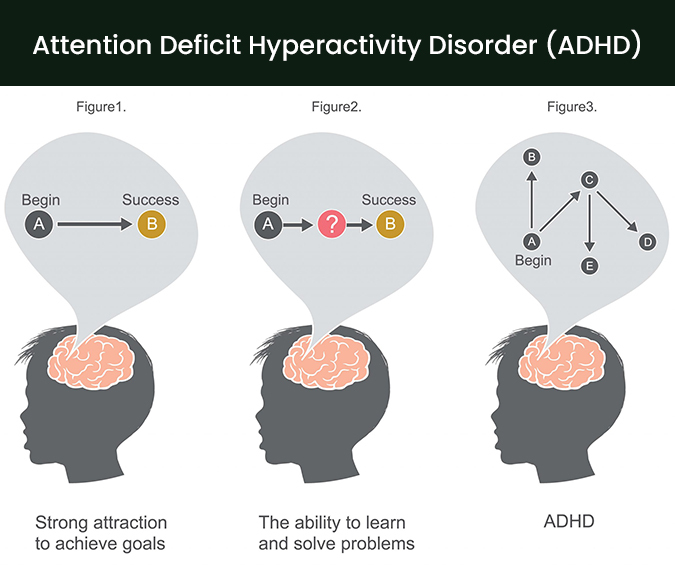

Table of contents
ADHD (attention deficit hyperactivity disorder) and ADD (attention deficit disorder) cause problems at school, work, and in relationships. The experts at Online Psychiatrists can help you get fast relief from your ADD/ADHD symptoms from the comfort of your home or office. Dr. Ivanov is a Harvard University board-certified psychiatrist and has extensive experience, enabling him to provide proven and effective ADHD treatments.

Attention-deficit/hyperactivity disorder (ADHD), also known as attention deficit disorder, distractibility, and inattention deficit disorder, is a common behavioral disorder characterized by persistent inattention, hyperactivity, and impulsivity.
ADHD is usually diagnosed in childhood, but it can often last into adulthood, affecting areas of the brain that prevent you from concentrating, planning, and understanding the behavior of others. People with ADHD are usually impulsive and often overly active.
Depending on the symptoms, there are three types of ADHD:
Attention deficit hyperactivity disorder tends to be inherited.
"ADHD is not a 'disorder'. The only difference is in how your brain learns and processes information." - says Dr. Zlatin Ivanov, Top Rated ADHD Psychiatrist.

The exact cause of attention deficit hyperactivity disorder is not known, but it is associated with various factors such as genetics, environment, and developmental factors.
"ADHD is not some terrible pathology that is visible from the earliest development. It's just a minimal brain dysfunction that causes the brain to work in a specific way." - says Dr. Zlatin Ivanov, Psychiatrist.
Most often, the disease appears before the age of 4, but the age at which a definitive diagnosis can be made is 8-10 years. In some cases (e.g., with a symptom of lack of attention without hyperactivity), the syndrome can be diagnosed only in adolescence.
The main symptoms of ADHD:
Often, ADHD is manifested by anxiety, irritability, depression or apathy, and severe behavioral disorders. One common but often overlooked symptom is ADHD Paralysis - a state of mental "freezing" when faced with decisions or tasks, making it difficult to start or complete activities. Attention deficit hyperactivity disorder can be diagnosed only by specialists, so if you suspect ADHD, make an appointment with our experienced ADHD specialists at Online Psychiatrists.
If you are located in New York, New Jersey, or Florida and are looking for ADHD treatment nearby, contact Dr. Ivanov, a leading expert in the field. Trust the experienced psychiatrists at Online Psychiatrists to make the correct diagnosis and get the best online ADHD treatment for adults, children, and toddlers.

Harvard Certified
Nationally Recognized
Book AppointmentAttention deficit hyperactivity disorder treatment usually involves a combination of prescribed medication, psychological therapy, and the development of symptom management skills. That is why each patient needs to be closely monitored to find an effective ADHD treatment.
We offer a variety of ADHD treatment options for adults in New York City that include:
The best treatment option for ADHD is a comprehensive one - psychological correction in combination with medications. Dr. Ivanov has extensive experience treating a wide range of mental health issues provided in various formats, including online consultations, to make sure you feel as comfortable as possible on your journey to positive change in your life.
After struggling with ADHD for years, I was hesitant to start treatment. But working with Dr. Zlatin from Online Psychiatrists was a game-changer. He took the time to explain the condition to me and crafted a treatment plan that works for my unique needs. The virtual visits were convenient and easy to use, and the ADHD medication management has truly transformed my life.
The level of care and support I received here has been instrumental in my treatment journey. They provide effective telepsychiatry that leads to successful outcomes in dealing with specific conditions. Whether it's ADHD or depression, Dr. Ivanov’s approach is tailored. I’ve been a client here for about 7 months, and I'm grateful for his expertise, understanding, and commitment to improving mental health through virtual visits. THANK YOU
Finding a reliable and caring psychiatrist can be challenging, but Online Psychiatrists made the process incredibly smooth. I sought help for my ADHD, and I was connected with a highly skilled professional who specializes in ADHD treatment. The virtual appointments allowed me to receive the care I needed from the comfort of my own home. The psychiatrist listened attentively to my concerns, provided valuable insights, and worked with me to develop a personalized treatment plan. This plan works ideally for me.
I've had attention deficit since childhood. But it wasn't until I started the virtual sessions that I truly felt seen and understood. The convenience of connecting with a Manhattan psychiatrist from my own home has been life-changing. So far so good...
Online ADHD treatment can be a practical part of a treatment plan because it allows you to receive virtual counseling from the comfort of your own home. This is incredibly convenient for people who find it challenging to visit doctors due to concentration problems or hyperactivity.
Perhaps you are a parent looking for ADHD treatment for children or information that will facilitate daily care for your child. In this case, our online ADHD psychiatrist can be your coach in creating and following a daily routine.
Although online consultations are very convenient, it is essential to consult an experienced ADHD doctor before starting any new treatment plan.
As your ADHD doctor at Online Psychiatrists, Dr. Zlatin Ivanov helps you find the correct combination of ADHD treatment options for your stage of life or family dynamics. Helping you increase your focus helps you better navigate your daily life. Contact our psychiatry practice in NYC, NJ, and Florida today for a consultation.
To get an ADHD diagnosis as an adult in New York, you should consult with a psychiatrist, psychologist, or clinical social worker who specializes in ADHD. They will conduct a comprehensive assessment, including a personal history and symptom evaluation. Contact your health insurance provider to find a specialist who will cover the cost, or inquire about telemedicine options.
For adults with ADHD, cognitive behavioral therapy (CBT) is recommended to combat negative thinking patterns and develop practical skills. ADHD coaching that focuses on organization, time management, and goal setting can also be helpful. Therapy should be tailored to the individual, so it is important to discuss options with a mental health professional.
The treatment of ADHD in adults usually involves a combination of medication and therapy. Medications such as stimulants (e.g., Adderall, Ritalin) and non-stimulants (e.g., Strattera) help to control symptoms. Therapeutic options such as cognitive behavioral therapy (CBT) and ADHD coaching support behavioral changes and coping strategies. In addition, lifestyle changes, such as better organization and stress management, can complement treatment.
Diagnosing ADHD in an adult can be difficult due to the overlap of symptoms with other conditions and the availability of specialized healthcare facilities. However, with a thorough assessment by an experienced professional, a diagnosis can be made. An experienced adult ADHD specialist should be consulted for an accurate assessment and diagnosis.
ADHD symptoms can change with age but do not necessarily worsen. For some adults, symptoms can be better managed with appropriate treatment and coping strategies. For others, however, difficulties may increase due to life demands, stress, or untreated symptoms. It is important that people with ADHD continue to work with healthcare professionals to adjust their treatment plans as needed.

Dr. Zlatin Ivanov, MD, is an adult psychiatrist specializing in addiction treatment, ADHD, anxiety, depression, and OCD. He offers exceptional talk therapy and medication management through online video conferencing.
Dr. Ivanov is double board certified in Psychiatry and Clinical Neurology and a member of the American Psychiatric Association. His medical career is colored by many outstanding contributions to medicine, including several publications, research, and scientific presentations. An attending psychiatrist at Woodhull Medical Center in Brooklyn, NY, and Bellevue Hospital Center in New York City, he takes the time to listen to patients and makes sure they know he is committed to their unique situation.
 Our Locations
Our Locations
The Chrysler Building
405 Lexington Ave, #2601
New York, NY, 10174 (map)
300 Carnegie Center Drive #150K,
Princeton, NJ, 08540 (map)
701 Brickell Avenue, 1550#A,
Miami, FL, 33131 (map)